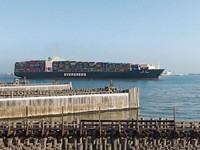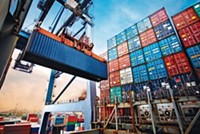Advertisement
Grab your lab coat. Let's get started
Welcome!
Welcome!
Create an account below to get 6 C&EN articles per month, receive newsletters and more - all free.
It seems this is your first time logging in online. Please enter the following information to continue.
As an ACS member you automatically get access to this site. All we need is few more details to create your reading experience.
Not you? Sign in with a different account.
Not you? Sign in with a different account.
ERROR 1
ERROR 1
ERROR 2
ERROR 2
ERROR 2
ERROR 2
ERROR 2
Password and Confirm password must match.
If you have an ACS member number, please enter it here so we can link this account to your membership. (optional)
ERROR 2
ACS values your privacy. By submitting your information, you are gaining access to C&EN and subscribing to our weekly newsletter. We use the information you provide to make your reading experience better, and we will never sell your data to third party members.
Trade
Chemicals held hostage in China-U.S. trade spat
U.S. and China put forward import taxes that would affect chemical industry
by Jean-François Tremblay
April 9, 2018
| A version of this story appeared in
Volume 96, Issue 15
Groups representing the U.S. chemical industry are expressing alarm at the potential impact of a trade war between the U.S. and China. The two countries have both proposed lists of goods, each worth $50 billion annually, that will be subject to a 25% import tax if trade negotiations fail in the coming months.
Caught in the crossfire
Proposed U.S. and Chinese tariffs of 25% target many chemicals.
U.S. tariffs
▸Amino alcohols
▸Bulk drugs containing antibiotics, insulin, or ephedrine
▸Hydralazine
▸Lidocaine
▸Methyl ethyl ketoxime
▸Triethanolamine salts
Chinese tariffs
▸Acrylonitrile
▸Aromatic polyamides (such as Kevlar)
▸Catalysts containing precious metals
▸Low-density polyethylene
▸Petroleum-based lubricants
▸Polyvinyl chloride
Note: Select examples from U.S. and Chinese announcements
“China is one of the U.S. chemical industry’s most important trading partners, importing 11%, or $3.2 billion, of all U.S. plastics in 2017,” said Cal Dooley, CEO of the American Chemistry Council, which represents large chemical firms. “We are particularly concerned that 40% of the products to which China has assigned new tariffs are chemicals.”
The Society of Chemical Manufacturers & Associates (SOCMA), a trade group for specialty chemical producers, also expressed concern. “Many of the proposed targeted products will impact the business of specialty chemistry, from vital upstream building-block materials to the dozens of downstream market segments,” CEO Jennifer Abril said. SOCMA members will be doubly burdened, Abril noted, by paying more for Chinese inputs while also facing import taxes when selling in China.
Released first, the U.S. list of targets contains 1,300 items, many of them relatively obscure. The U.S. Trade Representative explained that it selected goods benefiting from Chinese government support but excluded ones that would disrupt the U.S. economy or harm consumers.
Much narrower, with 106 items, the list of retaliatory tariffs proposed by China includes immediately recognizable goods like cars, airplanes, and soybeans. The chemicals targeted are also major ones, such as low-density polyethylene, other large-volume polymers, the fiber intermediate acrylonitrile, adhesives, and catalysts.
Analysts at the investment firm Jefferies said the tariffs, if implemented, would not necessarily cause major harm to U.S. chemical firms because many have production facilities in China.




Join the conversation
Contact the reporter
Submit a Letter to the Editor for publication
Engage with us on Twitter